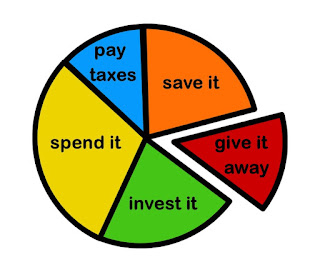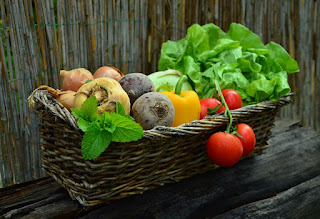- spend it (bills, food, holidays, electronics...)
- save it (in a bank account or under the mattress!)
- pay taxes (or else the government comes after you)
- invest it (in something you hope will make more money)
- give it away (to charities, good causes, family or friends)
Giving away
The full hundred percent
A similar idea occurs in environmentalism, where it's often stated like this:
When we spend money [or invest it or donate it] we cast a vote for the kind of world we want.
Money has a power not only over our own hearts, but in the wider world. It can be invested in fossil fuels and used to buy endless throwaway items. Or it can be a means of supporting local businesses and funding advances in green technology. When Jen Gale writes about money in her Sustainable(ish) blog, she doesn't usually urge her readers to give more to green charities, but to redirect the flow of their pensions, investments, and day-to-day buying decisions to create a better future.
Look at what it chose
You may think that you don't have much choice about where a lot of your money goes. After all, everyone has to buy food and have a place to live. But even in these simplest of expenses there are questions to ask.
Do you buy the cheapest food you can so that you are able to afford your other bills and keep out of debt? Or so that you can be generous, welcoming as many as possible around your table?
Or do you spend the extra on higher-welfare meat and organic veg, even if it means you eat beans more often than beef? Do you save in other areas so that you can buy food which aligns with your principles?
When you look for a house, do you buy the biggest house in the best area that you can afford, as an investment for your children? Or do you live in as small a place as you can, supporting initiatives in the community with the money you save on rent? Do you live on your own or share with others?
Just about the only one you don't have a choice on is paying your taxes. That's where the other kind of voting comes in, I guess, to try and get a government which uses its tax revenue justly, compassionately, and equitably.
Too many choices!
I know. All that talk about choices just makes you want to buy a tub of Ben & Jerry's and eat the whole thing with a spoon, without having to worry about whether it's ethical, environmental and a good moral choice - or not. The whole idea that every penny of our money can push our world in one direction or another can get completely overwhelming.
This is where we swing back round to tithing again. Essentially, tithing is a kind of budgeting, and one thing budgeting is good for is reducing the number of decisions to make. Once you've decided to give ten percent of your income, that decision is made. You don't have to think about it every month. Likewise, you can decide how much you're able to save, or choose only to buy free-range eggs.
Our money, like our hearts, tend to flow in certain directions when we're not paying attention. But when we do pay attention, it can be relatively easy to redirect the flow and carve out a new channel. Just a few different choices can be enough to carry our finances, our hearts, and the world around us in a better direction.
And just maybe, you might find yourself buying someone a skipping rope.



Comments